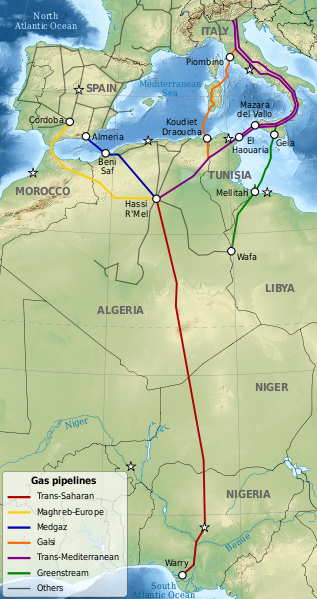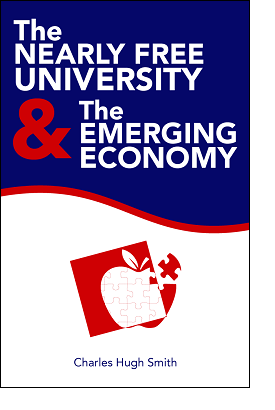(March 4, 2014)
Scrape away the media sensationalism and geopolitical posturing and it boils down
to a simple dynamic: follow the energy.
Though many seem to believe that internal politics and geopolitical posturing in Ukraine
are definitive dynamics, I tend to think the one that really counts is energy: not
only who has it and who needs it, but where the consumers can get it from.
Let's cut to the chase and declare a partition along long-standing linguistic and
loyalty lines a done deal. Let's also dispense with any notions that either side
can impose a military solution in the other's territory.
Media reports on the weakness of Ukrainian military forces abound (for example,
Ukraine Finds Its Forces Are Ill Equipped to Take Crimea Back
From Russia), but Russia's ability to
project power and hold territory isn't so hot, either.
A knowledgeable correspondent submitted these observations:
RE: Russian Army. Effective draft evasion is running 80%. Morale is low, training is very poor and
poorly funded. The Russian army has also gone through 22 years of near continuous
contraction.
And this standing army has heavy commitments in the Caucasus and Far East Siberia.
Moreover, at least half of these Russian ground troops are short term 12 month conscripts.
I don't think these kids will produce many usable and motivated troops.
The low morale recently seen in the Ukrainian Berkut and other police will be multiplied
by at least 10x.
Russian speaking Ukrainian bands are rumored to already be crossing the
borders into Russia territory. They're to be ready to sabotage bridges
and infrastructure and generally retaliate. Fluent Russian speakers
with many years experience of living in Russia. Who can say for sure if
this has already happened or is just being threatened? We can say this
is a very real danger. These people look just like "Russians."
And we can also say this threat will seriously complicate Russian rear
area security and logistics. And speaking of logistics, the distances
in south Ossetia and Abkhazia were very short and the populations were
entirely friendly. Neither condition prevails in the Ukraine outside
the Crimea.
Supplying moving armored units over hundreds of miles of occupied
country is very difficult logistically. The logistics for air assault
helicopter units are just as bad. These helo units look mobile but
they're a lot like a yoyo being twirled around your head on the string.
They only go fast within a fixed radius anchored by logistics that are
about as heavy to move as an armored division's supply columns. That is
years in the 101st Airborne Division talking. The fuel consumption
rates are immense. Stuff starts breaking down fast.
Conclusion: a de facto partition is already baked in because neither side can
force a re-unification. Various jockeying and posturing will undoubtedly
continue for some time, but the basic end-game is already visible: de facto partition.
Let's move on to correspondent A.C.'s observations about energy.
This map rounds out the European energy Rosetta Stone. When they hear that
Italian fighter jets are over Tripoli, or that the French Foreign Legion has returned
to the deep Sahara Desert, they can can better understand the reasons and real
objectives of such operations.

source:
Many have noted that
the Russia economy is critically dependent on oil and gas exports to the EU.
It should be noted that the converse is less true every day about EU dependence on
Russian oil and gas. The Wall Street Journal even had a line about an EU proposal
to push natural gas EAST to the Ukraine. It's hard to understand that passage
or where the natural gas could come from unless one understands the North Africa to
southern Europe gas pipelines.
The factors bringing the conflict in Ukraine to a head are:
1. The natural gas discoveries in eastern Poland and western Ukraine played the
largest role.
2. The reduced importance of the gas pipeline running through the
Ukraine to Europe as compared to 2009. Since that time the Nordstream
lines have been finished and Gazprom acquired commercial control of the
Belarus pipeline. The South Stream lines are well along in development.
3. Fast developing liquid natural gas (LNG) seaport terminal infrastructure.
Events in Libya, Mali and Algeria are not hermetically isolated from
this. They are part of a comprehensive energy policy problem being
dealt with by the same leaderships. It increasingly looks like a series
of peripheral Energy Wars that are being fought out for control of Europe.
LNG exports are going to become a weapon in the struggle for geopolitical influence and
control.
This highlights another problem for Russia/Gazprom. Its present natural gas advantage in
Europe now rests mainly on its pipeline infrastructure. This advantage is fading
due to the current and proposed pipeline projects running through Turkey to Europe,
plus LPG terminal & ship developments, plus the five trans-Mediterranean pipelines
from Libya, Algeria and Morocco to southern Europe,
plus local shale gas plays...
The Ukraine is not the only country becoming less systemically important to Europe for
natural gas supply. So is Russia. Current events will only accelerate everyone's
efforts to diversify away from such an unstable and apparently dangerous supplier.
I think the long-term fallout from the Ukrainian Crisis will be similar to China's
attempt to exploit its temporary low price monopoly position in rare earth metals
a few years ago. The result is rare earth metals are becoming less rare by the day
as alternate mines outside China are opened and reopened.
Thank you, A.C. Scrape away the media sensationalism and geopolitical posturing
and it boils down to a simple dynamic: follow the energy.
The Nearly Free University and The Emerging Economy:
The Revolution in Higher Education
Reconnecting higher education, livelihoods and the economy
With the soaring cost of higher education, has the value a college degree been turned upside down?
College tuition and fees are up 1000% since 1980. Half of all recent college graduates are jobless or underemployed, revealing a deep disconnect between higher education and the job market.
It is no surprise everyone is asking: Where is the return on investment? Is the assumption that higher education returns greater prosperity no longer true? And if this is the case, how does this impact you, your children and grandchildren?

We must thoroughly understand the twin revolutions now fundamentally changing our world:
The true cost of higher education and an economy that seems to re-shape itself minute to minute.
The Nearly Free University and the Emerging Economy clearly describes the
underlying dynamics at work - and, more importantly, lays out a new low-cost model for
higher education: how digital technology is enabling a revolution in higher education
that dramatically lowers costs while expanding the opportunities for students of all ages.
The Nearly Free University and the Emerging Economy provides clarity and
optimism in a period of the greatest change our educational systems and society have seen,
and offers everyone the tools needed to prosper in the Emerging Economy.
Read Chapter 1/Table of Contents
print ($20)
Kindle ($9.95)
Things are falling apart--that is obvious. But why are they falling
apart? The reasons are complex and global. Our economy and society have structural
problems that cannot be solved by adding debt to debt. We are becoming poorer, not
just from financial over-reach, but from fundamental forces that are not easy to identify.
We will cover the five core reasons why things are falling apart:

1. Debt and financialization
2. Crony capitalism
3. Diminishing returns
4. Centralization
5. Technological, financial and demographic changes in our economy
Complex systems weakened by diminishing returns collapse under their
own weight and are replaced by systems that are simpler, faster and affordable. If
we cling to the old ways, our system will disintegrate. If we want sustainable prosperity
rather than collapse, we must embrace a new model that
is Decentralized, Adaptive, Transparent and Accountable (DATA).
We are not powerless. Once we accept responsibility, we become powerful.
Read the Introduction/Table of Contents
Kindle: $9.95
print: $24
NOTE: Contributions/subscriptions are acknowledged in the order received. Your name and email
remain confidential and will not be given to any other individual, company or agency.
|
Thank you, Charles M. ($5/month), for your most excellently generous subscription
to this site -- I am greatly honored by your support and readership.
|
|
Thank you, Joel H. ($5/month), for your wondrously generous subscription
to this site -- I am greatly honored by your support and readership.
|
"This guy is THE leading visionary on reality.
He routinely discusses things which no one else has talked about, yet,
turn out to be quite relevant months later."
--Walt Howard, commenting about CHS on another blog.
"You shine a bright and piercing light out into an ever-darkening world."
Jeremy Beck
Contributors and subscribers enable Of Two Minds to post 275+ free essays annually.
It is for this reason they are Heroes and Heroines of New Media. Without your
financial support, the free content would disappear for the simple reason
that I cannot keep body and soul together on my meager book sales alone.
Or send coins, stamps or quatloos via mail--please
request P.O. Box address.
Subscribers ($5/mo) and those who have contributed $50 or more annually
(or made multiple contributions totalling $50 or more) receive
weekly exclusive Musings Reports via email ($50/year is about 96 cents a week).
Each weekly Musings Report offers five features:
1. Exclusive essay on a diverse range of topics
2. Summary of the blog this week
3. Best thing that happened to me this week
4. Market Musings--commentary on the economy & global markets
5. From Left Field (a limited selection of interesting links)
At readers' request, there is also a $10/month option.
What subscribers are saying about the Musings
(Musings samples here):
The "unsubscribe" link is for when you find the usual drivel here
insufferable.
All content, HTML coding, format design, design elements and images copyright ©
2014 Charles Hugh Smith, All global rights
reserved in all media, unless otherwise credited or noted.
I am honored if you link to this essay, or print a copy for your own use.
Terms of Service:
All content on this blog is provided by Trewe LLC for informational purposes only. The owner of this
blog makes no representations as to the accuracy or completeness of any information
on this site or found by following any link on this site. The owner will not be liable
for any errors or omissions in this information nor for the availability of this information.
The owner will not be liable for any losses, injuries, or damages from the display or
use of this information. These terms and conditions of use are subject to change at
anytime and without notice.



 1. Debt and financialization
1. Debt and financialization